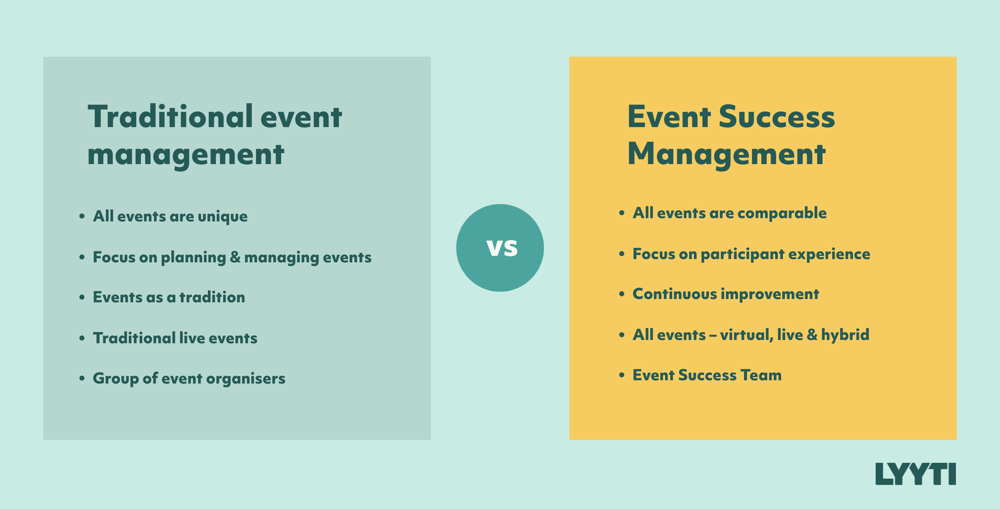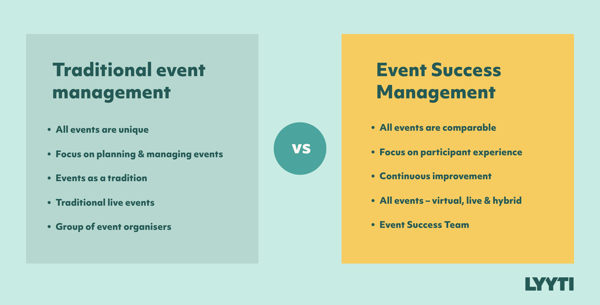Organise an event. Run the event. Follow up on the event. Organise the next event. Run the event. Follow up on the event.
Sound familiar? The hamster wheel of traditional event management never took you anywhere beyond the goals of that specific event. This left your organisation doomed to learn the same lessons multiple times and see mistakes replicated, wasting time, resources and opportunities. However, recognising the limitations of this is only the first step.
We don’t say this lightly. We believe that event management, as currently viewed and known, is dead. It’s a methodology confined to history as it’s replaced by Event Success Management, a system that links all your events together, no matter how disparate the topic. It revolutionises the event industry with the concept of continuous improvement.
This doesn’t change some of the practicalities. You’ll still have to deal with many of the same tasks, from event marketing to planning and running it, but there has been a seismic shift in how to approach events.
"We believe that event management, as currently viewed and known, is dead."
Rather than treating each event as a detached happening, all events organised within an organisation are being linked together to measure, develop, learn and improve each subsequent one.
Systemic methods of continuous improvement are established in many areas, from industrial engineering through to sports like Formula 1. Now, when there's a way to measure success across all events, the future business winners will be applying the same logic.
The pandemic-fuelled rise in acceptance of virtual technology and how individuals were forced to adapt to their use has spread event responsibility and capabilities. There's still a need for event specialists, but now, from HR to marketing, organising events is a staple of everyday life across many roles.
This circulation of knowledge is why the outdated model of viewing events in one-off terms will leave some companies a step behind. Event Success Management is the solution, unifying results across all the different organisers and sharing knowledge and pathways to better outcomes.
The five cornerstones of Event Success Management
In simple terms, Event Success Management is a lean and practical approach to ensuring that every event you organise is more successful than the previous one. It integrates agile methodology to create a circle of knowledge and experience, one event feeding into the next in a continuous cycle of improvement.
It can be summarised through five specific differences to traditional event management. In Event Success Management:
- All events are comparable
- The focus is on the participant experience
- Events should undergo continuous improvement
- It applies to all events - virtual, live & hybrid
- You should create an Event Success Team

Event Success Management makes event participants the focus
The most expensive resource at an event is the time of the people attending. When you put that fact in the centre of everything you do, it alters the shape of your approach. Suddenly, an event isn’t only about taking care of event practicalities or meeting business goals. Instead, it’s also about ensuring that the experience of those that attended is as positive as possible.
By this, we don’t mean there was free coffee and nice biscuits. We mean the attendees felt their time there was well spent. The most effective way to do this is to ensure you’re constantly improving and delivering a superior event to the last one.
"An event isn’t only about taking care of event practicalities or meeting business goals. Instead, it’s also about ensuring that the experience of those that attended is as positive as possible."
You need to alter your mindset around events. This isn’t a quick fix for immediate change or a long-term commitment that pays off at some distant future point. It’s an alteration in attitude and approach that will influence short, medium and long term results.
The world of events has evolved, and you have the opportunity to be part of the front line by adopting this methodology when it's already becoming a standard.
What added value does Event Success Management bring?
No matter what kind of events you're organising or what you're trying to achieve with them, there's one universal factor that makes any kind of encounter a success. Happier attendees mean better outcomes.
Someone who believes their time was wisely invested will be more likely to engage with the goals you have for the event, whether internal or sales based.
Measuring the response to an event in a unified and quantifiable way allows you to compare it directly with previous ones. This helps you not only identify what worked but also what didn’t. This is where Experience Value Score comes in.
The more invisible benefit is the change in mindset this approach fosters. By moving away from siloed events and, instead, linking them all together in an effort to improve continuously, you’re creating a culture shift for your organisation. You’re sharing valuable lessons with everyone that organises events, and, in turn, everyone is striving to find ways to better the outcomes.
The combined effect of ongoing gradual improvements is significant. It's often reported that Albert Einstein once said, “Compound interest is the eighth wonder of the world.” Now, apply that logic to how your events can improve, and you can see the potential in the system.
What happens if we stick to traditional event management?
We’re not saying you won’t hold successful events. In isolation, you could still organise some that prove to be a triumph. However, it’s that exact success that feeds the weakness of old fashioned event management as the power of what you did well is left behind when your company organises its next event.
Sometimes the shock of the new can be disagreeable. We understand it’s hard to break free of habits and systems that may superficially appear to be working, but there are moments to be bold and embrace innovation. The upheaval in the world of events has led to an opportunity for organisations to benefit from the changes.
Let’s put it in simple terms with five concrete reasons why you must adopt Event Success Management now:
1. As you replicate and optimise your successes further, it will lead to better event experiences for attendees and better business outcomes.
2. When you're motivated to improve continuously, you'll start delivering better events with a metric that allows comparison.
3.As you develop organisation specific best practices, you learn what your target audience best responds to.
4. Cross-team sharing of lessons learnt helps you avoid duplicating mistakes and means great ideas spread quickly.
5. No single knowledge silo can be forever lost if, for example, one person moves to a new position in another company.
Join the movement!
We've established a global Event Success Community for sharing insights and best practices; to bring people together to revolutionise the event industry. The Event Success Community is for everyone who is passionate about creating continuously greater value to participants and hence to all stakeholders in the event business.
The change starts with your next event.
Liknande artiklar

Event Success Management – En ny era inom event management

The Event Marketing Playbook – Skapa framgångsrika event!

Steg-för-steg: Hur du skapar bättre Event Marketing för dina Event

Exempel på en komplett marknadsföringsplan för event (plus gratis mall)





